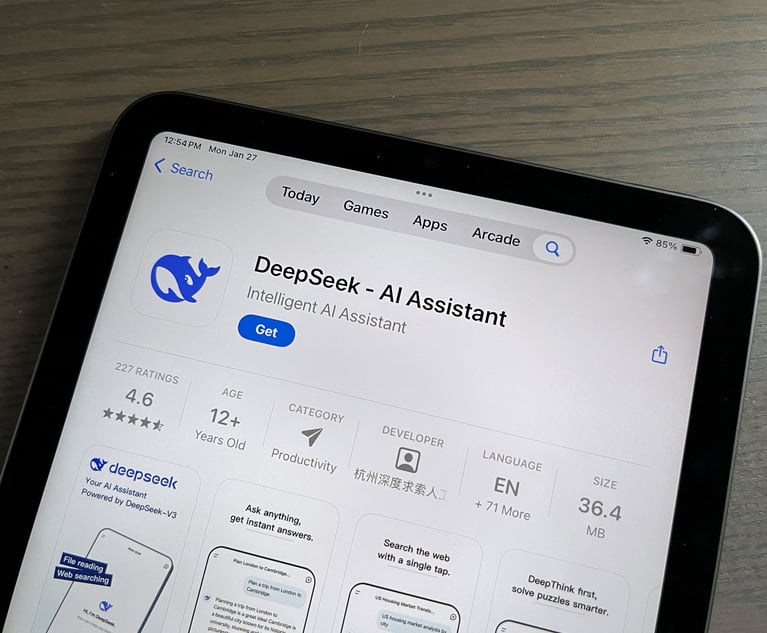COVID-19 May Boost E-Signature Adoption in Reluctant Mortgage Ecosystem
COVID-19-related mobility restrictions may increase the adoption of e-signatures in the mortgage space, but largest changes may be to people and processes instead of laws.
April 02, 2020 at 11:30 AM
4 minute read
The original version of this story was published on Legal Tech News
 (Photo: Shutterstock.com)
(Photo: Shutterstock.com)
COVID-19 has forced many aspects of day-to-day life to go remote, and in the case of e-signature use in the mortgage space, the impact may already be rippling out. However, the biggest changes may not be to existing e-signature laws, but the people and processes that make up the mortgage ecosystem.
Margo Tank, U.S. co-chair of the financial services sector at DLA Piper, indicated that the adoption rate of e-signatures by the various entities comprising the mortgage ecosystem has grown throughout the last three to five years as people have become more comfortable with the technology and processes required. But she also noted that the surge in remote working associated with the COVID-19 outbreak over the last three weeks has accelerated the adoption base as well.
"I can't really imagine that we'll go back once people see the ease and efficiency and cost savings of moving their processes online. It takes a lot of energy and money to [implement], but once it's done, I just can't imagine that we'll go back to paper, " Tank said.
To be sure, any resistance that e-signatures have faced over the last 20 years may have more to do with people than the law itself. In 1999, the National Conference of Commissioners on Uniform State Laws proposed the Uniform Electronic Transactions Act, which gives legal recognition to electronic signatures. The act has since been adopted by 48 states in addition to Washington D.C., Puerto Rico and the Virgin Islands. Illinois and New York have also adopted their own laws around e-signatures.
But because there are so many stakeholders in the mortgage process—brokers, loan originators, closing agents, title agents, custodians—e-signatures may have taken longer to permeate the ecosystem. "Everybody in that entire mortgage ecosystem has to be rowing in the same direction and want to use electronic signatures on the transactions," Tank said.
And the truth is that some may have been more hesitant than others, reluctant to embrace a "hybrid" process that included a mixture of e-signatures and paper. For example, while promissory notes and disclosures could be addressed with e-signatures, a deed of trust may still have been required to be notarized on paper. That's starting to shift now, with online notarization already enabled in 23 states.
Anthen Perry, an associate with Mayer Brown, said via email that the firm anticipates seeing additional states consider laws allowing for Remote Online Notarization (RON). "We expect that state legislatures will be seeing an increase in lobbying from segments of the real estate industry to pass RON legislation, as a way of keeping deals moving in light of COVID-19 related social distancing measures."
He also raised the possibility that RON legislation could be included in future federal stimulus measures, but cautioned there could be a bit of a "ramp up" period before the practice is widely used in the market.
Still, there are issues that could be causing mortgage ecosystem inhabitants some hesitation when it comes to e-signatures. Bradley Gardner, a shareholder at Polsinelli, gave the example of loan originators who are trying to resell a loan to somebody else. If the originator uses one e-signature platform and the person they are trying to sell the loan to uses another, there could be some confusion around how to proceed.
"It's not totally clear how all of those products can move from one system to another, which again just kind of creates enough murkiness to kind of cause lenders to shy away from it," Gardner said.
Other problems may not have a quick technical or even legislative fix. If a mortgage related issue should end up in court, for instance, judges who are used to ink on paper may not be sure what to make of e-signatures. This may require attorneys to do more legwork in order to bridge the knowledge gap. "Maybe now I've got to get an affidavit from somebody at DocuSign, for example, explaining how this signature was applied. It becomes potentially cumbersome from an enforcement standpoint," Gardner said.
This content has been archived. It is available through our partners, LexisNexis® and Bloomberg Law.
To view this content, please continue to their sites.
Not a Lexis Subscriber?
Subscribe Now
Not a Bloomberg Law Subscriber?
Subscribe Now
NOT FOR REPRINT
© 2025 ALM Global, LLC, All Rights Reserved. Request academic re-use from www.copyright.com. All other uses, submit a request to [email protected]. For more information visit Asset & Logo Licensing.
You Might Like
View All
Eighth Circuit Determines No Standing for Website User Concerned With Privacy Who Challenged Session-Replay Technology
7 minute read
The Time Is Now for Employers to Assess Risk of Employees’ Use of DeepSeek
4 minute read
Fired by Trump, EEOC's First Blind GC Lands at Nonprofit Targeting Abuses of Power
3 minute read
Houston Law Firm Files $250K Breach of Contract Suit Against 2 Former Lawyers
3 minute readLaw Firms Mentioned
Trending Stories
- 1Choice-of-Law Issues as the UCC 2022 Amendments Come into Effect
- 2Six Benefits of Taking an Opposing Medical Expert’s Deposition
- 3Ex-Prosecutor’s Trial Ends as Judge Throws Out Her Felony Indictment in Ahmaud Arbery Death Case
- 4Conversation Catalyst: Transforming Professional Advancement Through Strategic Dialogue
- 5Trump Taps McKinsey CLO Pierre Gentin for Commerce Department GC
Who Got The Work
J. Brugh Lower of Gibbons has entered an appearance for industrial equipment supplier Devco Corporation in a pending trademark infringement lawsuit. The suit, accusing the defendant of selling knock-off Graco products, was filed Dec. 18 in New Jersey District Court by Rivkin Radler on behalf of Graco Inc. and Graco Minnesota. The case, assigned to U.S. District Judge Zahid N. Quraishi, is 3:24-cv-11294, Graco Inc. et al v. Devco Corporation.
Who Got The Work
Rebecca Maller-Stein and Kent A. Yalowitz of Arnold & Porter Kaye Scholer have entered their appearances for Hanaco Venture Capital and its executives, Lior Prosor and David Frankel, in a pending securities lawsuit. The action, filed on Dec. 24 in New York Southern District Court by Zell, Aron & Co. on behalf of Goldeneye Advisors, accuses the defendants of negligently and fraudulently managing the plaintiff's $1 million investment. The case, assigned to U.S. District Judge Vernon S. Broderick, is 1:24-cv-09918, Goldeneye Advisors, LLC v. Hanaco Venture Capital, Ltd. et al.
Who Got The Work
Attorneys from A&O Shearman has stepped in as defense counsel for Toronto-Dominion Bank and other defendants in a pending securities class action. The suit, filed Dec. 11 in New York Southern District Court by Bleichmar Fonti & Auld, accuses the defendants of concealing the bank's 'pervasive' deficiencies in regards to its compliance with the Bank Secrecy Act and the quality of its anti-money laundering controls. The case, assigned to U.S. District Judge Arun Subramanian, is 1:24-cv-09445, Gonzalez v. The Toronto-Dominion Bank et al.
Who Got The Work
Crown Castle International, a Pennsylvania company providing shared communications infrastructure, has turned to Luke D. Wolf of Gordon Rees Scully Mansukhani to fend off a pending breach-of-contract lawsuit. The court action, filed Nov. 25 in Michigan Eastern District Court by Hooper Hathaway PC on behalf of The Town Residences LLC, accuses Crown Castle of failing to transfer approximately $30,000 in utility payments from T-Mobile in breach of a roof-top lease and assignment agreement. The case, assigned to U.S. District Judge Susan K. Declercq, is 2:24-cv-13131, The Town Residences LLC v. T-Mobile US, Inc. et al.
Who Got The Work
Wilfred P. Coronato and Daniel M. Schwartz of McCarter & English have stepped in as defense counsel to Electrolux Home Products Inc. in a pending product liability lawsuit. The court action, filed Nov. 26 in New York Eastern District Court by Poulos Lopiccolo PC and Nagel Rice LLP on behalf of David Stern, alleges that the defendant's refrigerators’ drawers and shelving repeatedly break and fall apart within months after purchase. The case, assigned to U.S. District Judge Joan M. Azrack, is 2:24-cv-08204, Stern v. Electrolux Home Products, Inc.
Featured Firms
Law Offices of Gary Martin Hays & Associates, P.C.
(470) 294-1674
Law Offices of Mark E. Salomone
(857) 444-6468
Smith & Hassler
(713) 739-1250








